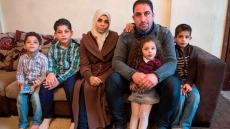WHITEHORSE — Twenty-six years after her son murdered 14 women in Montreal, Monique Lepine still doesn't know why.
"Maybe he felt unloved, left aside," she said of her son Marc Lepine, while speaking this week at the 12 Days To End Violence Against Women campaign in Whitehorse.
During her 90-minute, key-note talk at the Kwanlin Dun Cultural Centre, the 78-year-old woman reflected in a soft-and-calm voice on the abuse she and her children had suffered at the hands of her former husband.
"If you didn't solve your emotional problems when it was the time, eventually you're growing, you're an adult, but emotionally, you're still at the age of your wound."
On Dec. 6, 1989, Marc Lepine, 25, armed with a 223-calibre Sturm-Ruger rifle, separated the men from the women in a classroom at Montreal's Ecole Polytechnique.
He spoke about his hatred for feminists and went on a shooting rampage, killing 14 women and wounding nine others.
He then shot himself.
Monique Lepine relived that day, repeating for the crowd a story about how she prayed when she heard about the shootings, only to find out the gunman was her son.
"My son killed himself, but I was the one left with all the consequences," she said.
Seven years after the massacre, her 29-year-old daughter killed herself in a drug overdose, she said, noting her daughter suffered guilt about not having the chance to reconcile with her brother.
Lepine said the following day she realized she had lost what she had dedicated her life to: her children.
"I felt like I was dying of pain and sadness," she said.
Lepine said she reflected for 17 years after the shooting on the abuse she and her children had suffered at the hands of her former husband.
She said her spouse never paid child support, and never contacted her, even after learning his son was responsible for the Montreal massacre.
Lepine has previously said that her son was beaten severely by his father.
She said she was just starting to feel better when a deadly shooting struck Montreal's Dawson College in 2006 and the pain returned.
Lepine said she decided to speak up, appearing on Quebec's TVA and writing a book, "To Live."
"It took me a long time to make peace with myself because I thought I was the one responsible because everybody was saying that," she said.
She has since met and cried with a family of one of her son's victims.
"We were both in pain. We both had lost somebody we loved."
She underscored the importance of talking about emotions.
"All this hate we keep inside, if we don’t let it go, or ask forgiveness of the people we hurt, it will build up and lead to violent behaviour."
When asked how to help men who commit violent acts against women, Lepine said she didn’t know.
"I don’t have all the answers," she said, noting that men can have more trouble talking about their emotions. (Whitehorse Star)




